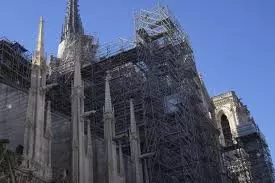
Notre Dame restoration unlocks secrets of medieval architecture and climate
text_fieldsThe restoration of the iconic Notre Dame de Paris, set to reopen this weekend after its devastating 2019 fire, has provided scientists with a treasure trove of insights into medieval construction techniques and historical climate patterns.
Researchers from the French National Centre for Scientific Research (CNRS) have turned salvaged materials from the cathedral into a unique opportunity for multidisciplinary study, revealing invaluable data about the 12th century.
The oak timber from Notre Dame's roof, destroyed in the fire, has become a focal point for research. Chemical analyses traced the wood's origins to forests within hundreds of kilometers of Paris, offering a glimpse into medieval forestry practices. Researchers, led by Valérie Daux from the University Paris-Saclay, used isotopic markers to reconstruct historical climate conditions. Their findings indicate cooler temperatures and variations in humidity compared to Alpine records, providing a nuanced understanding of the medieval environment.
Efforts to rebuild the cathedral’s vaulted ceiling have incorporated advanced scientific methods to ensure historical accuracy. Archaeologist Cédric Moulis from the University of Lorraine and mechanical engineer Stéphane Morel from the University of Bordeaux analyzed stone fragments recovered from the wreckage. Their studies ensured that reconstructed sections adhere closely to the structural integrity of the original design, preserving Notre Dame’s architectural legacy.
The fire melted over 285 tons of lead cladding, raising concerns about potential health risks. Research by the Regional Health Agency of Ile-de-France, published in Science of the Total Environment, found that lead exposure levels in Paris, including among children, remained within safe limits.
A cutting-edge digital twin of the cathedral, incorporating 3D scans and archival data, is slated for completion in 2025. Led by Livio De Luca, this digital replica aims to support ongoing restoration efforts and heritage science research, offering a comprehensive resource for future studies of Notre Dame's history and construction.























